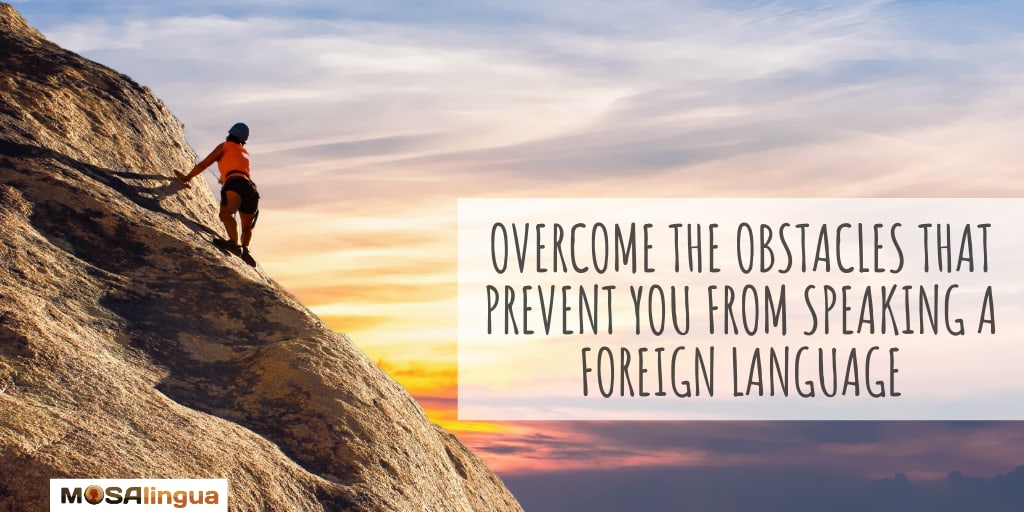Speaking in a foreign language can be stressful. You may be too shy or feel like you’re not good enough. Or you might be so worried about using the right pronunciation, sentence structure, or grammar that you end up hardly speaking at all. These kinds of mental barriers can cause people to lose motivation or give up altogether. So how can you overcome the obstacles that are keeping you from speaking your target language with confidence? Here are our best tips.

Also, if you prefer to listen to this article, you can head over to our MosaLingua Language Lab podcast:
Listen to “#44 – Overcome the Obstacles that Stop You from Speaking” on Spreaker.
How to Overcome the Obstacles Holding You Back and Start Speaking a Foreign Language with Confidence
Speaking in a foreign language doesn’t come naturally to anybody – not even the members of our own team. It’s something that you learn gradually, and it usually takes many months. To be honest, it’s impossible to fully master any language… The good news, though, is that you’re constantly learning. Think about your native language. You continue to learn new words and new expressions throughout your life.
And of course, we don’t learn a new language just to read and write, but also to speak it. This is where some of the biggest problems start because we often feel a lot of pressure when it comes to speaking out loud. You might have thoughts like “I don’t speak well enough,” “Are they going to understand what I’m trying to say?” or, “I need to get this sentence structure 100% right before I try anything else.” But these are the kinds of thoughts that can keep you from learning a new language and communicating with it effectively.
So how do you overcome these obstacles and become a more confident speaker? Check out these four case studies about four individuals, each of whom encountered different obstacles. But they all share a common problem: they have trouble speaking a foreign language.
Let’s take a look. You’ll see how easy it is to learn a new language when you have the right tools and attitude.
1. Shyness and lack of self-confidence
The first person I want to talk about is Maike. She’s always been very shy, even when speaking her native language, German. She suffered from low self-esteem, so speaking in English seemed impossible. She feared the prospect of even the simplest conversation in English and convinced herself that it would be a disaster.
What Maike really needed to do was to put things in perspective. After all, what’s the worst thing that can happen when speaking in a foreign language? Many of the reasons why you might believe that it’s hard to learn a new language are less serious than you probably think.
If you’re trying to say a new word you’ve learned but don’t pronounce it properly and the person you’re speaking to doesn’t understand, just try again! Otherwise, you might try using a synonym.
Even if you accidentally say something inappropriate, most people will understand that you’re still learning and won’t be offended. Maike also needed to equip herself with the right tools for the job. Keep reading to learn about some of those tools.
2. Being a perfectionist
Marco’s Italian, so confidence isn’t a problem for him – but he is a perfectionist. He tended to stick with simple vocabulary and sentence structures to be sure he wouldn’t make any mistakes. The main problem with this approach is that Marco couldn’t make progress in his target language.
When Marco figured out that his perfectionism was holding him back, he wrote “Nobody is Perfect” on a post-it and stuck it to his fridge, so that he would see it every day. Next, he asked native speakers to correct him any time he made a mistake. He realized that they would be his best allies for taking his language skills to the next level. You might like being corrected, or you might hate it, but either way, the emotional connection will help you remember the right word. Associating a strong emotion with a new word is one of the best ways to be sure you’ll remember it.
Marco hated the thought of being corrected but was able to transform that fear into motivation. Now Marco uses his MosaLingua app to create flashcards for the mistakes he’s made, so he never repeats them.
3. Stress
Marta is outgoing and loves to meet new people and share her Spanish culture with them. But when it came to speaking English, she would freeze up. Two things were stressing her out: not understanding people and not knowing how to respond. Marta thought of two ways to help reduce her stress.
First, she made a list of “safety phrases” that she could memorize and use any time she didn’t understand something. For example: “Could you speak more slowly please?” or “Can you please spell out that word?” Of course, if that doesn’t work, you can always look up the word in your MosaLingua app.
Next, Marta used the words she knew well to get around those she didn’t or that she had forgotten. If you’ve ever played Taboo, you know just what a fun challenge this can be!
If you’re like Marta and tend to feel overwhelmed by stress, you can also try some deep breathing techniques. In addition, it can be useful to limit your first conversations to a controlled, “safe” environment, like with a language tutor. This way, you’ll know what to expect.
4. Pessimism
Lastly, Michel is known for being a bit of a pessimist. He thought he’d never be able to speak English, and that it was too hard to learn a new language – so he never really tried. This is first and foremost a question of attitude. If you’re feeling pessimistic, too, try concentrating on the right things. For example:
Make a list of all the positive results that can come from learning and speaking a new language, and try to focus your attention on them.
Celebrate small wins. Focus on your progress and celebrate even baby steps, like being able to introduce yourself in your target language. The more you speak, the better you’ll get. And that will work wonders for your outlook.
Abbe’s Tips on How to Overcome Obstacles and Build Confidence in Your Target Language
Abbe explains all of these tips in the video below to help you find the courage to speak your target language with confidence. The video is in English, there are subtitles in 5 other languages if you need them. If you’d like to practice your English but Abbe speaks a bit too fast, click the settings button (the gear icon) in the bottom right corner and select a slower speed. Enjoy!
Don’t forget to subscribe to our YouTube channel, where you’ll find more tips and videos. And be sure to enable notifications by clicking on the bell icon.
So, if you’re like one of my friends above, I hope you’ll remember that you’re not alone and that there are many different ways to overcome the obstacles that might be holding you back. I’m confident that you’ll be able to speak with confidence, too. If you need a helping hand, our Speak English with Confidence MasterClass goes into detail on all these problems and more and will show you how easy it is to learn a new language when you are well equipped.
Related posts:
Start learning a new language today

Good news: we can help!
More good news: you can get started for free! Start your free trial now and for the next 15 days, take advantage of the most effective language learning method on the market!
Vocabulary flashcards, videos with subtitles, audiobooks, articles adapted to your level – with MosaLingua Premium (Web & Mobile), you’ll have access to all this and more. Get started right now. It’s free—and risk-free—to try!




Comments